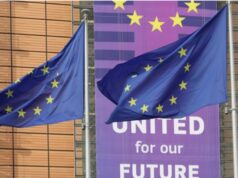Capitol Hill riots jolt Europe confidence in US with uncertain future
By
He Zhiga

What happened to the US? What happened to the liberal democracy in the US?
The US Capitol riots have stolen the spotlight worldwide, with the turmoil casting a shadow over the US presidential transition and the American Dream. US’ double standards in various spheres and the hypocrisy of its democratic electoral system have been unmasked to the entire world.
Some people may think this is a manifestation of the tenacity of the US political system as well as freedom and democracy in the country. However, whatever point of view people hold, the riots have exposed more thoroughly the political and social disintegration of the US. It will also have a spillover effect on the views of US allies in Europe toward Washington.
For a long time, there has been an opinion held by certain observers that Europe will no longer trust the US democracy and count on US’ global influence. US President Donald Trump’s tenure accelerated this belief, making it mainstream in Europe. For example, the EU has been pursuing to become a strategically autonomous actor on the world stage.
The divergences between Europe and the US are in not only policies but also ideas. These have evolved from notions of global governance to political systems and beliefs – despite the fact that Europe and the US have common Western democratic values. The two sides also share religious culture and historical traditions that have formed the foundation of the US-Europe relationship.
Ivan Krastev, a famous expert on Balkan and European affairs, believes that the Capitol riots have “made a laughingstock of America and its democracy” and dealt the “most effective attack on America’s alliances.”
As the US-Europe relationship is giving way to geopolitical and power competitions, divergences between them with values and norms are being amplified. Such cracks are hard to fix but will continue to widen. This is why both European and American elites have proposed to rebuild the trust of the Transatlantic Alliance with Joe Biden as the President .
The Capitol riots might contribute to the reconstruction of trust or further alienate relations between the US and Europe. Either way, the event will distract the Biden administration, whose handling of US domestic conflicts and divisions is crucial for US-Europe coordination.
The event was possibly an emotional catharsis, and the cause to it lay in US’ economic inequality, political fragmentation and group polarization. If the Biden administration cannot restore people’s faith in political institutions, US-Europe coordination will very likely fail to meet expectations. Following this, their political, military, technological and economic capabilities will be hard to be transformed into power to achieve freedom in a rules-based order. Therefore, it will be impossible for the US and Europe to jointly defend the West’s democracy, human rights and liberalism.
More importantly, the Capitol riots are prone to have spillover effects. Like the waves of democratization, backslides against democracy will probably become a trend. In recent years, right-wing populist forces in many European countries have continuously attacked the existing political structures.
During the COVID-19 pandemic, these forces hope to set off another round of Eurosceptic wave. With protests that happened in many European countries against the governments’ poor response to the pandemic, these right-wing forces aim to obtain more political capital. If this kind of social movement derails political operating mechanisms in Europe, the Capitol riots could be replicated on the continent.
Therefore, ruling parties in Europe have basically seized the opportunity of responding to the pandemic to consolidate the existing political structures. They are taking advantage of the crisis to improve their capability of governance and management.
In this special period when “big government” is needed, it is a common trend in Europe to stabilize the domestic political situation in order to avoid fragmentation and polarization. They do not want to see further splintering of political structures that could impact Europe’s political order.




